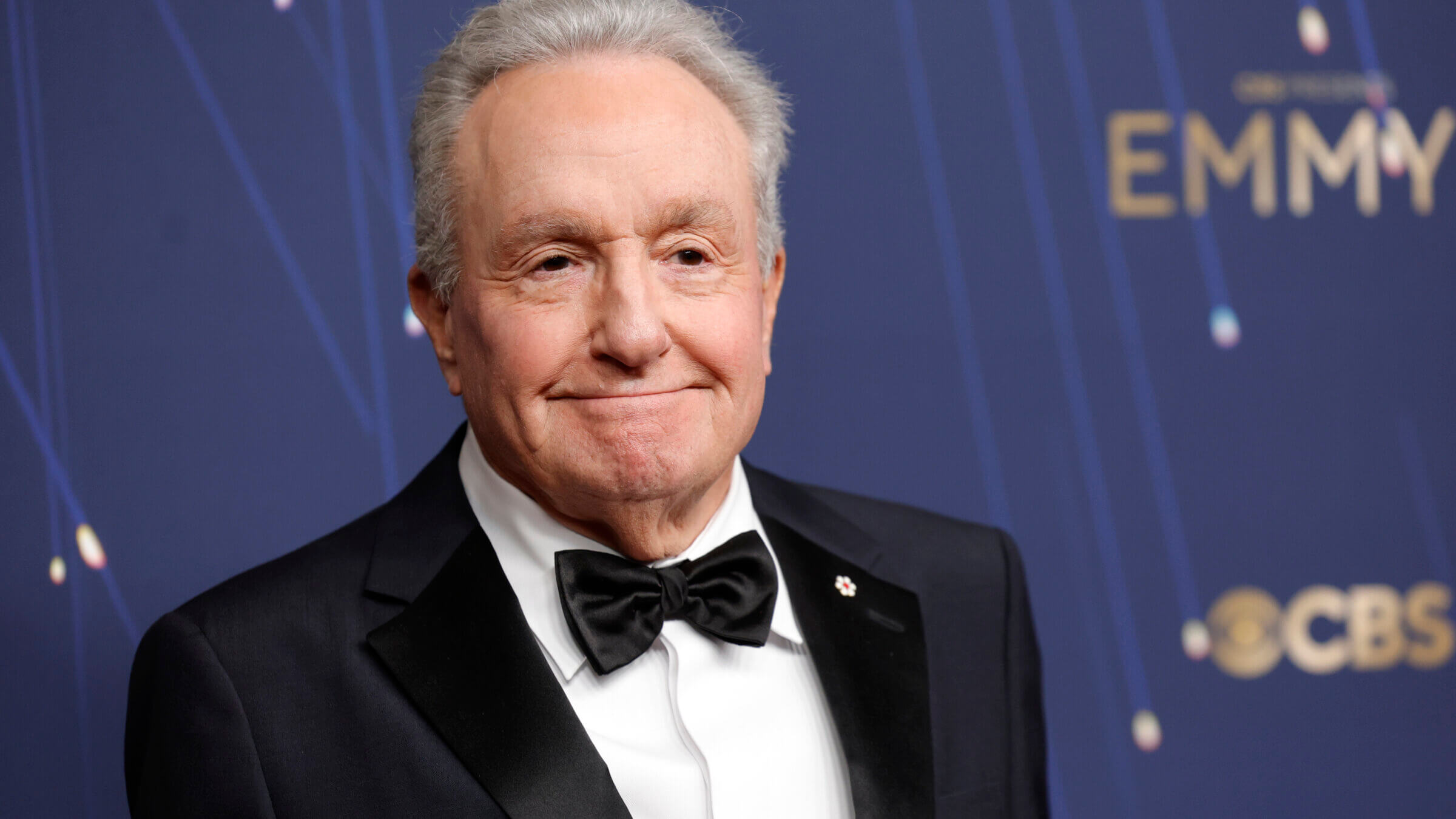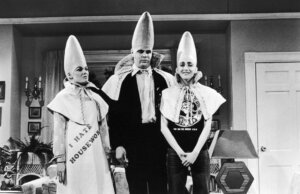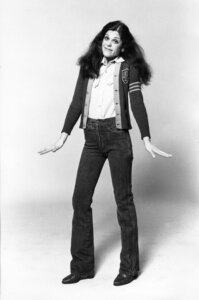Satire on ‘Saturday Night Live’ used to be a deadly weapon; is it still enough in the Trump era?
An exhibit of the papers of Lorne Michaels offers sobering insights about the limits of humor

Lorne Michaels at the Emmys, 2025. Photo by Getty Images
A funny thing happened when I went to Austin last week. My youngest child, Basil, a junior at the University of Texas, and I paid a visit to the university’s Harry Ransom Center.The crown jewel of UT, the Center is named after its founder, Harry Huntt Ransom, who began as a professor of English at the university and ultimately became its visionary president. In a speech he gave to the Philosophical Society of Texas in 1956, he declared “that there be established somewhere in Texas — let’s say in the capital city — a center of cultural compass, a research center to be the Bibliothèque Nationale of the only state that started out as an independent nation.”

Nearly 75 years later, the massive stone and glass building in the heart of the campus stands as the realization of Ransom’s dream. The Center’s holdings include nearly one million books along with some 42 million manuscripts, five million photographs, and 100,000 works of art; the manuscripts of Gabriel Garcia Marquez, Doris Lessing, Jack Kerouac and Ezra Pound are here; so are the papers of Albert Einstein and Robert de Niro; even original works by Frida Kahlo and Pablo Picasso.
Three of those last four iconic figures also appear in the Ransom Center’s most recent acquisition: the papers of Lorne Michaels.
Born Lorne Lipowitz in Toronto in 1944 — and not, as some folks still believe, on a kibbutz in Israel — Michaels is, of course, the creator of Saturday Night Live, the weekly NBC television comedy show that has been running, and often stumbling, since 1975. (Now 80 and with no plans to retire, Michaels has said he would like “Uneven” inscribed on his tombstone.)
The collection begins with Michaels’ years in theater productions at the University of Toronto and his early work in television — including his stints with The Beautiful Phyllis Diller Show in 1968 and, that same year, Rowan & Martin’s Laugh-In — before moving on to the half-century of SNL as well as the dozens of films on which Michaels served as producer.
As my Longhorn and I visited the just-opened and eye-popping SNL exhibit, I noticed, with a surge of verklempt, the index cards that Michaels tacks to a bulletin board every Friday, outlining the segments of the following night’s show. The show, after all, has to go on — a huge weight for a handful of cards to carry. According to his recent biographer Susan Morrison, Michaels often shakes his head slowly as he gazes at the index cards, concluding “We have nothing.”
But as anyone with a good memory or, lacking that, a good pair of walking shoes knows — the exhibit covers figuratively and literally a good deal of ground — there is much ado, and much to do, with that nothing. It is impossible to exaggerate the show’s impact on American culture and politics. There are, of course, the gag lines that have bled into everyday usage where the user usually has no idea of the line’s origin, such as Gilda Radner’s Emily Litella, who ends every misunderstanding with “Nevermind” and Stuart Smalley aka Al Franken’s mantra: “I’m good enough, I’m smart enough, and doggone it, people like me.” And, of course, the motivational blast of Matt Foley, played by Chris Farley, “I live in a van down by the river” as well as, yes, Mike Myers’ Linda Richman, who punctuates her monologues with “I’m getting a little verklempt.”
Yet, while this sort of humor zeroes in on cultural fads and ethnic tics, SNL has also specialized in satire with political bite, such as Will Ferrell’s coinage “stratergery” in his brilliant impersonation of George W. Bush — which, hilariously, Dubya proudly assumed he had himself coined — or the 2016 debates between Alec Baldwin’s Donald Trump and Kate McKinnon’s Hillary Clinton. In a small theater at the exhibit, this very sketch was repeatedly replayed. As I watched and listened — not for one, but two replays — I noticed that the knots of visitors, while mesmerized, did not often laugh. The silence was especially loud when Baldwin, playing Trump, suddenly given two more minutes to talk, lurches into this hallucinatory riff:
“The thing about the Blacks is that they’re killing each other. All the Blacks live on one street in Chicago, all on one street. I just read that this morning. It’s called ‘Hell Street’. And they run Hell Street and they’re all just killing each other. Just like I am killing this debate.”
In 2016, silence from the audience in Studio 8H would have been unimaginable; a decade later, laughter seems equally unimaginable. With the events now unfolding in Chicago and other “Democrat” cities under Trump 2.0, Baldwin’s rant is more a matter for laments than laughs. Perhaps some of the visitors wondered, as I did, what the Republican state leaders, housed just a short walk away in the capitol, would have thought of their state’s premier university showcasing this sketch. (One need not wonder very long, though, given that Jay Hartzell, the university’s former president, decided to resign rather than resist pressures from crusading Republicans to enforce the state’s ban on the use of DEI.)

Perhaps more important, the sketch raises a question worthy of “Coffee Talk” as well as for our collective and growing vibe of verklempt: Is comedy, even the middle of the road satiric fare at which SNL excels, the proper response to the tragic situation our country now faces? The answers to this question, long debated by political thinkers and actors, generally fall into two camps. In the first camp are those who believe that laughter is subversive, a weapon of the weak that reveals, through mockery and, as Dubya might say, snarkery, the incoherence of their justifications for taking power and the corruption that inevitably follows.
In short, comics show us an emperor with no clothes. This is a notion that Trey Parker and Matt Stone of South Park, unlike Michael’s middle-of-the-road SNL, have taken quite literally this year.
But as those in the other camp point out, even the sight of a butt-naked Donald Trump in bed with Satan has hardly dented the standing of a man who would be emperor. This camp’s slogan, to paraphrase W.H. Auden’s famous line about poetry, is that comedy makes nothing happen. Or, even more discouraging, it makes matters even worse. Comedy distracts us from grave matters at hand and, by diluting every event through entertainment, deadens our sense of outrage at the sheer cruelty and stupidity of this administration. Amusement, the sociologist Neil Postman observed 40 years ago, is “the supra-ideology of all discourse on television.”
Even, it seems, when the entertainment might qualify as Jewish humor. The efforts that have been made to explain Michaels’ humor, and that of SNL, through the prism of Michaels’ Judaism have mostly fallen flat for a simple reason: When Lorne Lipowitz opted to become Lorne Michaels, the biographer Morrison suggests, he also opted out of his Jewish upbringing. Morrison quotes one colleague who said that Michaels’ “yeah-yeah-yeah-yeah” verbal tic “is the one bit of Jewishness still left in him.” And yet, a way of being and seeing is not so easily uprooted. In Morrison’s book, Conan O’Brien marvels at his old boss’s achievement: “A Jewish kid who started out with a furrier for a father, and he somehow makes it to this place? Our insecurities, our defense mechanisms, are what we use to survive, and they build up, like plaque.”
Those insecurities and defense mechanisms, so fundamental to Jewish humor, are no longer unique to Jews in the Age of Trump. When we left the Ransom Center, Basil and I chatted about this subject. They thought there was something Jewish, or at least Jewishy, about the show. When I asked what made for Jewish humor, they paused before replying that it was self-deprecating yet also irreverent. This observation struck me as right, but also worrying. When the target of our humor is a president whose utter lack of reverence for our nation’s laws and norms endangers us all, irreverence makes for a dubious weapon, even for the weak.
















